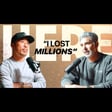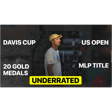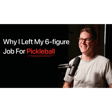Preventing and Recovering from Pickleball Injuries
00:00:00
Speaker
But one thing with pickable elbow I've seen and then studies have shown is the longer you've kind of like pushed through it, the harder it is for it to go away and the longer it takes to go away. The lack of overall grip strength is one of the major keys to getting pickable elbow as well as like getting rid of it.
00:00:17
Speaker
Ben is one of the most efficient movers out there. He never takes a false step. He doesn't waste any steps. That's why he seems so fast, because he gets to everything in the perfect amount of time and the perfect amount of steps. So he's very efficient. But they take their shirts off. They're not the most ripped jacks. The dudes out there, their legs aren't the biggest. What insights or thoughts would you want to provide the general audience on what they should be doing after training?
00:00:45
Speaker
Like most of the time I'll always say it, like boring wins, like doing the boring things savagely well wins you in the long. About durability, kind of like freebie. I'll actually maybe drop that in this. Sleep is going to be the most important factor for you. And for all of us.
Introducing Connor Derrickson and His Journey
00:01:02
Speaker
Let's say the next layer is probably going to be
00:01:08
Speaker
Welcome to another episode of Building Pickleball, and this is the founder series. Today, my guest is the first strength and conditioning coach I've had on this podcast, so I'm super, super excited to have him on. His name is Connor Derrickson, goes by that pickleball trainer. So Connor's a certified strength and conditioning professional through the NSCA. He's originally from Chincoteague Island, which resides on the eastern shore of Virginia.
00:01:33
Speaker
He completed his undergraduate degree from Salisbury University, where he studied exercise science. He also completed his graduate degree from Weber International University, getting an MBA with a focus in sports management. As a coach, he specializes in helping people achieve their sports performance goals by managing injury, monitoring stress, and increasing work capacity.
00:01:55
Speaker
Connor spent multiple years coaching for the Minnesota Twins Baseball Club as an affiliate and MILB rehab strength and conditioning coach. Man, thanks for that. Thanks for joining me. Yeah, of course. You crossed the hometown pronunciation. Let's go butcher that. Nice job. It's tricky, man. If I wasn't from Virginia, I wouldn't know.
00:02:17
Speaker
Yeah, yeah, 100%. Yeah, it's funny. We were just talking about this, like, before we started that Chincoteague Island is just known as... I feel like everyone's just like, so that's where the horses are, right? The horses. Yeah, we're actually going back there for that in two weeks. I think it's always like the last Wednesday in July. So we're actually going to go back for the little swim or whatever. So yeah. So is it like a seasonal thing or what? They do it every year. That's probably not what we want to talk about, but it's like they swam the ponies from
00:02:47
Speaker
You know, like the beach island where they run from free to like where we live on the island and they like auction off to keep the population down. And like, it's like all goes to like the town and the volunteer fire company and stuff like that. Damn. It's a big spectacle. Yeah. It's kind of cool. It's cool. That's awesome. That's awesome what they do. Um, and then you're currently in St. Petersburg, Florida. Yeah. Yeah. St. Pete. Um, yeah. A lot of pickleball here. That's for sure.
00:03:16
Speaker
Yeah, you were just telling me that it's number two for most courts. Yeah, sweet. A lot of public courts are popping up still. Um, good community for it, man. It's just, it's awesome. Like you, not many times, like we have a great place called Crescent Lake where you'll get, you'll always get like four and above level games at all times of the day, every day, which is kind of cool that like, even as people get better, you'll get some five O's out there that still just go out there and play pickup, not just in groups. It's pretty fun.
00:03:44
Speaker
Yeah. And, uh, what's your rating? I don't know. Um, it's all self rated. So like you've got to take that with a grain of salt. I asked Catherine and Travis and people that like I've hit with all the time. And they're like, I remember when I first started with Catherine, he's always asked me, like, am I like a three five yet? Or what? She'd be like, she was just like, she's so sweet about it. And she's like, no, not yet. But I've played a lot since we, we first started. So I don't know. Travis Graham, they say I'm like four, oh, maybe a little bit better, but
00:04:15
Speaker
So those are definitely some like huge names. And I remember looking into your profile and your background, like correct me if I'm wrong, but Catherine was the first pickleball pro that you worked with. Yeah. Yeah. Catherine was the first. She, she pulled me in her and Athena pulled me into the
Transition to Coaching Pickleball Pros
00:04:30
Speaker
world. And it was like, you know, I picked up a paddle a couple of times before that, like just dabbling, like everybody did kind of probably during COVID. And yeah, they brought me in full force and it's been, it's been nonstop ever since.
00:04:44
Speaker
Dude, that's awesome. Um, before I asked you about Catherine and how that all happened, I just have to say like, I was out recording for Julian Arnold, uh, at MLP. And so I got to like hang around her and see her a little, a little bit. I didn't really, I carry any conversation with her, but just even just being around her and Athena and also seeing her in like competition, she just seems like the most, like, like the nicest person that like wouldn't hurt a fly.
00:05:08
Speaker
Yeah. Sometimes like it's funny. Like if she ever has to like, like her telling me like I'm not a three five was like heart, you know what I mean? Like it's like just so nice. Uh, so yeah, that's just how she is with everything. It's, it's cool. Yes. Easy to work with. That's awesome. Um, so yeah, how did you guys get introduced?
00:05:27
Speaker
Yeah, so their coach pretty much recommended, not only a colleague of mine, but like in the strength and conditioning world, it's a pretty small world. Just like a friend of mine pretty much. It wasn't really a good fit for either of them. They never really even got started, but he recommended her.
00:05:46
Speaker
to me or yeah, recommended myself. So they reached out to me. We were kind of in the area and we ended up meeting up all the girls, you know, let's, let's see what this is about. You know, she's see what she's interested in.
00:05:59
Speaker
It's been, it's been greater since it's been almost a year now. Then I started traveling, you know, like right after that, you know, I started traveling with her and training her on the road and things of that nature. But yeah, like it was pretty much like it got a couple of references and they reached out and like, we just hit it off ever since. And I've been in Doba in full force ever since that as well.
00:06:21
Speaker
Dude, that's yeah, that's great. Um, it's interesting like being in a sport. An industry that's like rapidly growing yet. It's still like in these infancy stages and something I just didn't see often is a strength and conditioning coach. Like now I see mostly see you and there's this guy named Garrett Nealon who also happens to also be in from Virginia. Um, but I see both y'all's content and I'm like, awesome.
00:06:50
Speaker
It's very modern looking content. It's clean, but they're also hitting different areas. So are you still working with Catherine? Yeah. Yeah. Still working with Catherine. Still traveling with her. Yeah. Still pushing along. It's been just about a year, like I said.
00:07:07
Speaker
Yeah. And that's probably opened up some doors. So you had mentioned Travis and Graham. Is that the gentleman who is on tennis socks pot with him? Okay. The guy that's pretty much always, always with Travis, uh, he's the, they're both like part owners and the floor smash. So, uh, but they're local here. Like they, the both of them live probably a mile away from me here in St. Petersburg. So that's kind of how that connection got started.
00:07:35
Speaker
Oh, gotcha. Gotcha. Okay. Um, are there any other pros by you?
Local Pickleball Scene and Injury Trends
00:07:40
Speaker
Not really. Um, Austin last, tough last name plays APP a lot. Um, check out. Yeah, I'm not going to butcher it because I will buy a big Amazon man. That's why they, he calls himself. Um, but yeah, that's really it. Like for, for pros, Megan Fogg used to live here. Um, but other than that, it's just, it's pretty much just Travis.
00:08:01
Speaker
Something that I obviously do want to talk about and I'm sure you have a lot of great insights about is of course the injuries with that new article. You might have a better gauge of the exact title, but something about how the health care costs have increased like $400 million and the rise of injuries in pickleball. I have my own thoughts on it, but you know, of course I want to give you the opportunity. This is your platform thoughts. What are your thoughts? What do you think it is?
00:08:29
Speaker
I think one, it's just like more people are being active. So of course, if there's a larger sample size, you're going to have more incidents that happen. But also you're looking at it. It depends on the demographic, but if it is an older demographic, then of course you're going to see that too. But you're if you're also like if people are going couch to pickleball.
00:08:51
Speaker
That's a whole different story compared to if you took an athletic sample size and those people are getting into pickleball. But yeah. Yeah. Yeah. Whatever the number was, like 400 million estimated spending on medical bills and due to pickleball. Yeah. I mean, it's like kind of like you said, it's like let's say 100 people were playing football last year and then a thousand people are going to play next year. My guess is injuries are going to go up. And then let's say out of those thousand people,
00:09:21
Speaker
900 of them are 65. They're probably going to get hurt. They're probably going to trip and fall. That's the easy example. Okay, injuries are going to go up. 36 million people are playing pickleball, which is more than golf. It's more than all of these sports. You know what I mean? Obviously, injuries are going to be astronomically high, and it's a very quick reaction. Sport.
00:09:47
Speaker
let's just say you're old you don't you don't do anything besides we get out there and play pickleball you're gonna trip you're gonna hurt your elbow your wrist things of that nature so um it's not like surprising at all i thought i thought it was like i don't know when i saw the number come out i was like it's it's high obviously um it's a high number but
00:10:04
Speaker
We just don't, like, pickable is a participation sport. It's not a viewer sport, like, people aren't watching it on TV, like, yeah, okay, the numbers are up, but, like, it's 10,000 people. That's, like, nothing. You know what I mean? Like, it's not that many people watching the sport. It's a participation sport. Everybody's playing it. So, to see those numbers, it's not crazy that it's, and if you look, dove into the numbers, like, it was over 80% were
00:10:29
Speaker
over 60 years old or something like that. So it's like, yeah, it was like, I mean, it wasn't like anything shocking. It's mainly older people. But yeah, and those are like mainly trip and fall injuries where like the actual injuries you see a lot of like people that play a good amount and that are in the younger age, maybe it's more of like chronic lower back pain, right? Because like maybe they don't do much outside of pickleball. They're not training.
00:10:58
Speaker
They don't have some kind of plants, like they have like some kind of chronic lower back pain. Like on the professional level, you're seeing a lot of like foot and ankle injuries, just like not necessarily injuries, but like nagging, like plantar work, achilles, heel stuff. And I think that's just due to like overall workload of being on the court and tournaments and high level play.
Recovery Methods and the Peace and Love Approach
00:11:19
Speaker
And then like third one being like pickleball elbows. I mean, you see that a lot, obviously tennis elbow, whatever you want to call it.
00:11:28
Speaker
lateral epicondylitis, you see that a good amount. Those are the three that I see a good amount of. The pickleball elbow is 100%. If in an ideal scenario, you could give someone advice without having the context, of course, of who the person is, their age, and the specific injury, what would you say is probably the main contributor to pickleball or tennis elbow?
00:11:56
Speaker
I got you. Maybe it's like, you see a lot of, you know, a lot of people will blame it on like the weight of their paddle going out. It's like, all right, I increased my, changed my grip size and I increased my paddle weight. And then I went out and drilled whatever backhand volleys for an hour. And it's like, no wonder. A lot of times you'll see, it's like, you'll see people that like don't have any grip strength, like grip strength matters.
00:12:20
Speaker
So maybe they don't train, maybe they don't work out, they don't know a consistent plan, they play a ton of pickleball. Lack of grip strength is definitely a major cause to that. So being able to do farmer's carries for whatever, your body weight or at least
00:12:37
Speaker
Pull ups, rows, things of that nature. Things where you're gripping, you're pulling, and you're using your back will help build up that actual lower arm strength. More so than just cranking on some bands and doing light-weighted stuff like this. Actually putting a load through it. Maybe doing a deadlift. You're going to increase your actual grip strength more so doing a deadlift than you are by smacking some bands back and forth like this. These are good, and they supplement flexure extension stuff. It helps. But I think the lack of overall grip strength is one of the major keys.
00:13:08
Speaker
to getting pickable elbow as well as like getting rid of it. But then it's just like, it's a repetitive, it's a chronic diagnosis, it's a chronic injury. So it's like, a lot of times it's just, it's that repetitive motion of like the total extension of this elbow or total extension of this elbow when it's clicking and you're doing this for multiple times.
00:13:29
Speaker
Obviously, it's bound to happen, but having sufficient grip strength will, one, help that. I have what's called pickleball durability or elbow durability, kind of like freebie. Actually, we can maybe drop that in this YouTube or in the bottom, and that can help. So that has a lot of this stuff in it.
00:13:50
Speaker
as well as like little overhead work so like maybe like you have insufficient overhead mobility within the shoulder and like maybe your elbow takes a little bit more of the beating in some instances there's a lot of factors that kind of go into it but my thing would be first and foremost training consistently and grip strength increase that a lot that goes into it so that was like my way not really trying to beat around the bush but like give you a couple specifics
00:14:15
Speaker
Now, dude, I really appreciate that insight because it's very difficult to say, give a solution without knowing the exact problem. And of course, kind of tying back to what you said about people is like what their goals are. So, yeah, I really appreciate you giving that.
00:14:32
Speaker
And I also really value that your first thing that you, the first thing you said was not like rice. And this is probably going to be like, this could be very controversial, but back in the day, rice for those that don't know, it's rest ice compression, elevation that used to be like a very popular.
00:14:54
Speaker
methodology but then the same guy apparent from what I understand that that same guy went back and he said that was actually wrong yeah and exactly what you've said now is strength you've gone the complete opposite direction and I am
00:15:13
Speaker
100% on board with that. It's like, don't avoid it. Don't rest. And it's like, it's stuff that's happened to me. Even myself, like I've fractured my fibula during a jujitsu accident. First thing I did was like, first thing I wanted to do was. Okay. I had to go to the doctor and figure out like the right placement so that it didn't heal in the wrong way. But it was like, okay, as soon as I can going right straight to walking, like movement was always the solution for me.
00:15:42
Speaker
to road the road to recovery. And I don't know what your thoughts are on that. Yeah, it's the more people that understand that race is kind of.
00:15:51
Speaker
been tapped out, you know what I mean? It's like written really thing the better. And there's another acronym called Peace and Love that for soft tissue injuries, I'll typically follow. Soft tissue being obviously like muscular injuries. So let's say you pull a hamstring. First thing you wanna do is obviously like peace and love out. Let's see if I can get the whole thing. It's like protect the tissue. So like just don't do anything that's gonna harm it.
00:16:18
Speaker
E is going to be elevate the tissue so like you can still elevate and get blood away from the tissue directly after. This isn't like the first three days. A is going to be avoid anti-inflammatories. It's a natural process that you want your body to do and go through. So like pop in a ton of Advils, not really going to help the situation. C is compression. You can wrap and do things of that nature that kind of helps like push blood out and then get blood in. I forget the last E.
00:16:46
Speaker
own piece but that's like all within like the like two to three day window or whenever like that kind of process is depending on the grade and then love is like load so like after you slowly start to put load back through the joint and through the muscle so like it's not rest and ice and then it's like get back to work it's like you got to get some load through that joint first whether that's be like for your circumstances that was walking at first and then you maybe started doing some light whatever isos with your body weight and then
00:17:15
Speaker
some weighted work, you know what I mean? O is peace and love. I think it's like being optimistic, like getting down about the injury. V is like vascularization and then E is, I forget the last one, but it's pretty much the process of like taking a little bit of time off and like
00:17:36
Speaker
letting the body naturally get blood in and outside of the tissue as well as like right after that it's like let's get some load through this thing instead of going out and like let's say you got pickleball although instead of like maybe it hurts a ton right now.
00:17:49
Speaker
Maybe take a couple days off. You let it kind of rest and do its thing. But then instead of just going out there and back to drilling and back to that same chronic bang, bang, bang, bang, bang on the elbow, maybe you start to get actual load. The pain resides a little bit. You start to get load through the joint. You start doing some rows, carries, deadness, grip strength work. Get load through the joint and start to strengthen it.
00:18:12
Speaker
That's, I kind of didn't really get the whole acronym. I can't remember it off the top of my head, but that's a good thing to kind of follow when you have some kind of soft tissue injury. Speaking of exercise, let's talk about Viori who sponsors this podcast and my favorite things about them besides their clothes. One, the AI fit tool. So this helps get you a lot closer to the actual size that you should be wearing.
00:18:33
Speaker
and plus it saves your size making a smoother checkout for next time. The Viori Active Club, ACTV. This is essentially just free workout classes. This is really neat because you can access these free workout classes just by going to their site.
00:18:48
Speaker
There's no barrier to entry here. They're super easy to access and they have everything ranging from abs to core to strength as well as shorter 10 to 15 minute workouts and longer 30 to 45 minute workouts. If you haven't already, check out their site and enjoy a 20% discount off your first purchase by going to vyori.com slash building pickleball. Enjoy the rest of the show.
00:19:14
Speaker
That's awesome. I will definitely make sure to link your pickable durability file once I get that from you and then also the piece in love. I'll make sure that's like at the bottom of the screen. Damn, that's awesome. OK, yeah, that load part. Gosh, that's so important. Super important.
00:19:33
Speaker
But one thing with pickleball elbow I've seen and studies have shown is like the longer you've kind of like pushed through it the harder it is for it to go away and the longer it takes to go away. So if you've had it for a couple days and then you start to take care of it maybe you take a little day or two off you rest and then you start to train and it kind of goes away. It's gonna go away a lot faster but if you like push through for weeks at a time it can take a little bit of a while to go away for sure. I've seen it like I've worked with someone right now it's still it's like
00:20:00
Speaker
not getting worse, but it's getting maybe marginally better a week over a week. Gotcha. Yeah. Okay. Man. I always thought that that was the hardest thing for not even when I was coaching, but even just being around certain people, like certain people that are athletes is not doing the work initially, but it's actually like after you do a workout or the training is like the post training. Like how do you treat your body after training? Like what are you eating?
00:20:28
Speaker
but also like are you foam rolling are you doing like dynamic stretch or not dynamic like static stretching what insights or thoughts would you want to provide the general like audience on what they should be doing after training yeah i look at it like so being pretty general let's say you have like a pyramid
00:20:55
Speaker
The base of that pyramid is kind of like the foundation, the most important aspects. For recovery, let's say the base of that pyramid is probably going to be sleep. If I'm training super hard and I'm sleeping four hours a night, you're not helping anybody, you're not really getting better. Sleep is going to be the most important factor for you, and for all of us. Let's say the next layer is probably going to be your nutrition.
00:21:20
Speaker
I'm training really hard, I'm sleeping really well, and I'm eating like dog crap, I'm going out to Mickey D's, getting a couple McDoubles and some nugs. It's not ideal, right? You're not fueling your body for performance, you're not fueling your body, maybe you're not getting the amount of protein that you need. That next one may be like...
00:21:41
Speaker
like stretching and recovery workouts and like maybe after a hard workout you need to most of the time you'd like need some kind of light movement after because like let's say you train really hard you play pickleball one day and then the next day you're like couch potato and you watch Netflix all day it's super hard to get going that following day so like doing nothing
00:21:59
Speaker
like you never want to be like a super high workload next day super low it's just it's not what your body wants you want these peaks and then you want to be able to move a little bit so like stretches and things of that nature all right now let's say the top of the pyramid is more so like modalities so let's say like compression boots and sauna ice bath like
00:22:18
Speaker
If you don't have the bottom of the pyramid, this doesn't matter, right? Like if you're training super hard, you sleep for hours at night and you eat like crap, like it doesn't matter how much ice bath you're going to do, like you're not going to recover. So like building that base first, having a solid foundation within sleep, nutrition, recovery, stretches, things of that nature is going to be more important than the modalities, which I'm all for the modalities, but you kind of got to have that bottom self first.
00:22:45
Speaker
Man, just more just solid gems, man. I should honestly be paying you for this. Oh, it's good. It's fun. Dude, the sleep 100 percent like Matthew Frazier. I'm sure you're aware of who he is. For those who are listening, Matthew Frazier's that I think he's one of the most CrossFit Games championships. And the biggest thing he said is like when he was having a talk, he was talking to his coach and he was like, dude, I'm doing everything that everyone else is doing. I'm doing the same lifts, except I'm doing better.
00:23:15
Speaker
And I'm hitting it harder. I'm hitting it just as hard as everyone else except harder. And he's like, so he's like, everyone else is doing the same thing you are. What separates people is what they do outside the gym. And he said that most important thing was sleep. He's like, you can't guarantee that everyone is sleeping the same amount or sleeping at the quality of sleep. Are they sleeping as good as you? And that was like one of his really big things. And then
00:23:42
Speaker
Um, your point about recovery, about if you hit an intense session, don't just take the day off completely next, the next day off completely. Like, man, I got into running in the past like year and in the training plan is.
00:23:57
Speaker
They'd always had that right if if my if Wednesday was our workout day Thursday was always a recovery run Saturday was our is our long runs So Sunday was always a recovery run. Never did you have a day off following a hard day? man, that's Damn, that's such a great point. So glad to hear you say that it's crazy to like these like
00:24:20
Speaker
are super boring. That's not sexy. If I post that on Instagram, it's gonna get four likes. No one wants to see, yeah, you need to sleep more. It's super simple, but it's so hard to do. It's so hard to be super consistent with your sleep every night and make that a priority. It's hard to be making your nutrition a priority. You work out, let's say, two hours pickleball, two hours in the gym. It's four hours a day. You have 20 hours to make other good decisions of sleeping and nutrition. That's super hard.
00:24:49
Speaker
it's boring it's simple but it ain't easy man it ain't for everybody that's for sure 100 man especially the nutrition aspect the food i've like throughout the times the past like two years actually like every year i've been every time i'm dating people the question one of the most popular questions is just like oh it's like what do you do you cook a lot do you like do you cook a lot at home and i'm like
00:25:13
Speaker
Yeah, I cook, but everything I cook is just efficient meals. It's, it's boring. Like if I, if I tell that to a chick, it's doesn't sound sexy at all. I'm like, yeah, it's like rice, a protein. And then there's like some vegetables and I have like smoothies. It's exactly what you're saying. It is very boring, but man, if you stick to it, it pays dividends in the long run.
00:25:38
Speaker
So true. That's so true. It's boring. It's not going to win on social media, but it might win you some games. So it's going to help.
Remote Coaching and Flexible Training Plans
00:25:46
Speaker
You were doing like remote and in-person training and I've looked into you have like a web app. Now I'm kind of going into your kind of business side and your content creation side. But also like back when I was a personal trainer, a web app didn't really exist or at least any quality ones that could really
00:26:06
Speaker
They hindered the relationship between a trainer and the client as opposed to nowadays. It's very it's more like enhancing it What is that experience like? coaching people remotely It's different it's different and I
00:26:22
Speaker
It's definitely not for everybody, and I don't think it should be. I make sure it's trying to be a good fit for both of us, but most people are like, if they want some kind of coaching or training, there's three different types of people.
00:26:37
Speaker
One being you're super novice and you need accountability and you kind of want someone hovering over you and telling you what to do, right? That's probably an in-person situation, in-person trainer. On the other side of the spectrum is more of like just kind of give me a plan. I know what I'm doing. I've been here before. Maybe I have a background in it or something like that. I just need a plan.
00:27:03
Speaker
Yeah, not much real guidance. And then there's like that middle tier, where most of our clients and athletes are is I need plan, I need guidance, maybe some accountability, as well as like, I want to, I don't need you necessarily hovering over me every second, but I want to communicate and let's, I want to grow with you kind of deal.
00:27:23
Speaker
So that's kind of like, that's what we do is, you know, our app is, you know, it's not something I designed or I built. It'd be cool. A lot of people have done that and built their own apps. Something I buy, I pay for, right? Like, and I kind of branded it as my own. But yeah, our app is, it's, I hope and try to make it feel like we're there beside you, like leaving notes and things of that, like videos and stuff like that.
00:27:49
Speaker
But, you know, you're kind of on your own. Like, you can do it by yourself and on your own time, because that's always hard. Like, people trying to schedule sessions with a personal trainer and it's like, yeah, their hours are from 5 to 6 a.m. and like 5 to 6 p.m. You know what I mean? It's like hard to get in. So it's like, it's flexible, it's easy, but you get the aspect of like feeling like we're kind of there with you and we're kind of walking you through that process.
00:28:14
Speaker
You have a very like systematic approach to things, which is great. Just wanted to recognize that. But something that was cool is that the web app, something that you make a great point about is that it's flexible. People live now with like remote culture and work from home and just with just like, yeah, the overwhelming directions, everyone's being pulled through for like work, family relationships and all that. That flexibility seems like a huge benefit to that web app.
00:28:43
Speaker
It is. No one wants to be tied down. Some people want to be tied down to a certain time, and it's like you got an hour, and it's like, well, the hour's up. Let's rock and roll. Here, we charge based on not just a monthly payment. You might have three, or if you want seven workouts, one every day, twice a day, that's what you're going to get.
00:29:06
Speaker
And it's on your time, on your schedule, so it's super flexible. It's
Social Media's Influence on Fitness Perception
00:29:10
Speaker
fun, man. You get to help a lot of people, a lot of amateurs that are just like, maybe love Catherine or love Travis or love Fed. And they're like, yeah, I want to play like them, which is cool. But you get to help a lot of people. Only difference is like, you know, which I still do some in person here at my house is you can't get like too super nitty gritty, right? Like sometimes I want to go like,
00:29:30
Speaker
and depth in certain little things, but it's like sometimes you just need to have somebody in person. So that's one of the downfalls. But other than that, it just comes down to if they can communicate really well, then I'll be able to help them out a lot.
00:29:47
Speaker
Yeah. This is kind of like a sidetrack, but Travis, man, I remember I went to PPA Rockwall and I was hanging there with my buddy and we're just like walking around and Travis is like he was like during a match. I think he was I think he was like practicing and he just like quickly took his shirt off, was just changing because the Texas heat and we're like behind him and we're looking at his back and we're like, dude, that is the most in shape, like was he like 45?
00:30:17
Speaker
He's like 40, but yeah The grace the grace the grace making baby look a little older. Yeah Yeah, we looked at we're like dude. That's insane. This dude is jacked to the gills dude never wears a shirt I'm surprised even had one on at the time so he's quick to take that thing off
00:30:37
Speaker
Yeah, man. I was just like, damn. Like I've been lifting since I've been like in my teen years. So I just have always, there's just that bro culture of just respecting a guy for like physique and the hard work they put in. So when I saw it, dude, I was like, damn, I hope I'm in like half as good a shape as that dude. So, man. Yeah. Congrats to both the work that you guys put in on that end. Um, you work with Stackshoot too. Yeah. Mm-hmm.
00:31:05
Speaker
Dude, what is that like? That dude can
00:31:08
Speaker
He just, I don't know what it is, but his, the way he plays singles is great. His movement is everything. Like, like, again, like we've mentioned, like you've mentioned before, it's your line, train patterns, not muscles. Um, clear that guy isn't the most jacked in a physique sense, which if you're an athlete, I wouldn't expect you to be, but movements and agility and patterns like you've, uh, like focused on, man, like what is it like working with that guy?
00:31:37
Speaker
I mean it's fun and that's what we do. We train a lot of patterns, we train a lot of functional movements that can relate to the sport and that are going to be similar to the sport.
00:31:49
Speaker
So like, I mean, he crushes it. Like he's not going to be like, he's not going to like, and some of your like best movers and most athletic people like aren't the most ripped either. You know what I mean? As you probably know, like he, he or somebody else, like Ben, like Ben is one of the most efficient movers out there, right? Like he, he never takes like a false step. Like he doesn't waste any steps. That's why he like seems so fast because he like, he gets to everything in like the perfect amount of time and the perfect amount of steps. So he's very efficient. Um,
00:32:17
Speaker
But they take their shirts off like they're not the most ripped jacked dudes out there or like their legs aren't the biggest. But you just gotta get good at the patterns of the sport, right? Like get really strong in those patterns, get really fast in those patterns and that's all it's about, right? Like having a strong base, strong foundation and fast in the demands of the sport. That's what it's about. Find the demands of the sport, train the demands of the sport.
00:32:41
Speaker
I can't wait to like highlight. I'm just going to caption that. Like it throughout the video is there's just a lot of these really good lines and points. He's like, another like great thing that you're doing is these like phrases and these one liners. These are more likely to stick than if someone were to comes out of efficiency, right? Like I'm going to remember, it's very easy to remember for me to remember train patterns, not muscles, try find the demands of the sport, train the demands of the sport. You definitely could tell that that comes from.
00:33:10
Speaker
years of coaching and just your dedication to the craft which is awesome. The only mistake you'll see is like and I guess you see it because it's like we live in this world of like social media and like trying to make a presence and trying to make a name it's like
00:33:26
Speaker
People try and make it so sexy. The sexy stuff usually just isn't the best. So much good is one in the simple movements. Most of the time I always say boring wins. Doing the boring things savagely well wins you in the long run.
00:33:49
Speaker
I want to get fast hands, so I'm going to like band my hands and like do all this crazy stuff and like try and make it super sports specific. And just like the sport and like all these fancy cones and hurdles and banded this and like, it's just like, sometimes you're like reaching a little bit too much. So that's why like we, we keep things super simple. Um, cause we do believe that like boring wins, boring wins consistency and being like consistency over time is what a, what it all comes down to.
00:34:20
Speaker
another like just gems man just like absolute gems of knowledge and just so easy to get caught up in like you said the fancy stuff the stuff that looks like over the top because it's just like when my brother wanted to get into lifting and I I don't consider myself necessarily athletic I consider myself more like I'm a strong guy my numbers were always like really good so like like really high
00:34:47
Speaker
body weight to like PR, like ratios and stuff, right? But when my brother got into lifting, Hughes was just like, dude, well, I saw this video. I saw that video. I was like, yo, honestly, you just stick to compound movements and you don't just stick to the basics like bench, squat, deadlift. And if you ever feel like you're not doing enough, instead of adding
00:35:11
Speaker
additional exercises just add those core those core exercises like more than once a week it's like when we're trying to get like heavy lifting so like instead of just deadlifting once a week deadlift twice a week you don't have to go like all crazy you can also add like variations like for deadlift do block bulls do deficits you don't need to buy like those crazy equipment and start like jumping off stuff
00:35:37
Speaker
especially when you're like not training like you're just trying to get stronger and that lift it's like do that lift more that's like your sport you know it's like weightlifting if you're gonna be competing in clean and jerk and snatch like that's your sport dude go do it like you they do it like three times a week you know five six times a week like
00:35:56
Speaker
So yeah, it's funny. People can easily overcomplicate things and be like, they want to get better at pickleball. And it's like, most times you just need to play pickleball. That's probably your lowest hanging fruit is like, go play more pickleball. But I mean, if you're really not that athletic, then yeah, we can fix a lot in the gym. But yeah, it's kind of funny.
00:36:16
Speaker
Yeah. And dude, you're lying. Boring wins. It's a hundred percent true. I wish. Yeah. I need to start remembering that more often. Yeah. Yeah. There's a quote about it, but it's just like at the end of the day, what separates successful people from not successful people is really just that successful person has the ability to do, be consistent and do the boring stuff multiple times. Like you just,
00:36:45
Speaker
Yeah. So true. It's like, and it's, it's boring wins, but like the, it's not easy. It's simple, but it's not easy, right? Like it's, it's hard to show up every day. It's hard to show up and train. Like a lot of people don't like to train like, let's say on the week of a tournament, right? You play Thursday, Friday, Saturday, probably Sunday, but like we have the work capacity to do so. And we think it's going to be best for you to do so. Like maybe we train Monday, Tuesday, like that's not easy. Um, and it's hard, but it's boring and like, we're not doing crazy stuff, but
00:37:13
Speaker
It's simple, not easy for sure. Before Pickleball, was that when you were with kind of in the baseball industry?
Coaching Athletes vs. Non-Athletes
00:37:23
Speaker
Yeah, so before Pickleball, for about two years, I kind of did just remote and in-person training after baseball. So first was like, I was in the collegiate setting. And then right after that, I went to professional baseball for almost three years, which was awesome. You know, you get to work with,
00:37:42
Speaker
It's a great experience. It's not for everybody, but it's a great experience. You get to work with a lot of high-level athletes, all the way from 18-year-old right out of the Dominican Republic that's super raw to 10-year bent, big legged. You get to work with all sides of the spectrum. But yeah, I was doing a lot of personal training for about two years out of my garage and remote training. And then Pickleball came about a year ago and been full force there.
00:38:14
Speaker
What do you say, what do you think is the biggest difference between personal training and strength and conditioning? Yeah. Yeah. I guess it depends on like, it all comes down to the athlete or the client, whatever you want to call them. Right. Like what are we training for? Right. Like the goals is, is what's going to dictate everything. Whether you're.
00:38:33
Speaker
a professional pickleball player and you have goals of being the best ever, or if you're a mom of three, but you want to train like a professional pickleball player, it's going to be similar. If you're a mom of three and you just want to be fit for life and work on aesthetics, then our goals are vastly different and the training and plans are going to be drastically different as well.
00:38:56
Speaker
What's the difference for you in terms of coaching athletes versus non-athletes? Yeah, typically your athletes, it comes down to like, they need what they need from you. So like, let's say like Catherine, Travis, people like that, Fed, they're going to need like,
00:39:15
Speaker
a great plan that is specific to them and around their schedule because their schedule is crazy. Where if it's not an athlete, it's more about building, probably they need some accountability, building a solid relationship with them, helping them stay accountable, building a solid routine and pushing them in that aspect and getting consistency out of them.
00:39:39
Speaker
Hopefully Catherine like her drive is to win more matches. So it's not it's hard. It's easy for her to show up where
00:39:47
Speaker
uh, just an everyday person looking to get fit. It's like, what am I doing this for? Right? Like it's, it's hard to see like longevity as a, as a goal. So, um, the accountability and the push and, and motivation is a little bit higher for like just your, yeah, you summed it up perfectly. Like I had a, it's very brief snip, but I was a personal trainer and like also did ex they call it like explosive performance coaching, um, is out of the gym, the sport health.
00:40:11
Speaker
You got to work with athletes, right? Like high school athletes. And then I couldn't figure out for the life of me, like why I started to not like personal training. And you just summed it up because with athletes, most of them want to be there and most of them don't have a problem with like the motivation.
00:40:28
Speaker
and like the discipline, and then you talked about it, it's just like with non-athletes, the accountability is sometimes the hardest or like the first step that they need to take and rightfully so. Yeah, sometimes they're a babysitter, you know what I mean? Like, you gotta babysit, like, or it's a little bit easier with like me and like being a, like,
00:40:47
Speaker
Like in baseball, sometimes these kids coming from other countries and they're young, they're just super talented. I've never picked up a weight in their life and they're like, why do I need to do this? They're not technically paying me. Where now it's a little bit easier, I'm like, dude, you're paying me money for this. Let's get the most out of it, you know what I mean? So it's a little bit easier in that aspect.
00:41:09
Speaker
Yeah, damn. It's yeah, I guess like even with like, yeah, it was very interesting, man. Like if you help a professional athlete, like achieve a goal and of course, like maybe they wouldn't match and stuff. I think it's very rewarding, but man, like helping someone that's just like your average, like every day person, like.
00:41:27
Speaker
shift their life and their mindset to becoming someone more active and like losing a ton of weight or reaching their goals I thought that was like just as equally as rewarding when you can help someone shift their mindset but you brought up a good point about talented players and talented athletes who have
00:41:49
Speaker
who are like, well, I've gotten this far. Why do I need to add at like A, B and C? How do you, how do you like deal with that? Yeah.
00:42:01
Speaker
That's a good question. So I think it depends where they are. So if I'm not like a mid-level player, right? I'm a middle of the pack professional here on the PPA. And you see that athletic performance is somewhat of a hindrance. It's like, all right, that's kind of a no brainer. It's like, this is my lowest hanging fruit right now possibly. Like maybe I had the skills, maybe I'm just...
00:42:25
Speaker
Body composition isn't right. I'm overweight or I just first have quickness is slow. You know, it's not there. That's like it's kind of easy. It's like you can see it. The athlete can see it. It's plain as day. Someone like let's say Catherine.
00:42:37
Speaker
she's when I came in she's already fast you know like agile mobile like all the things it's not like I'm gonna make her that much better right like I'm gonna hopefully keep her on the court longer but for her being at the top she's very good I'm hoping to one increase longevity play this sport for a very long time but also like
00:42:59
Speaker
It's all in the margins, right? If I can help Catherine get like 2% better, that's gonna help her win potentially a lot more games, right? Because when you're that good, like beating somebody like Ben and Anna Lee and people like that, like that's what it takes. Like everybody's investing so much money and potentially getting like 2% better.
00:43:17
Speaker
You know what I mean? And that's what everybody does at the highest level. You're basketball players, football players. You invest a ton of money and just hopefully getting just a little bit better. And that's my hope for most people. Hopefully, amateurs, I can help a ton. Mid-level pros, I can help a little bit less, but a lot. But hopefully, it means more to people like Catherine, like Fed, like Travis. Because just having that little bit of edge can get you over a big hump.
00:43:45
Speaker
Damn. Yeah, that's that's a great point, man. Those like margins. It's also what's also difficult is if they have a lot of people around them, they don't really know who contributed to that. Not that saying like taking away from whoever all those people's roles, but it's just very difficult to determine that. So like.
00:44:05
Speaker
I'm kind of saying that to say your job is very difficult because the difference you have to make is margins and it's difficult to quantify that until it's like 10 years from now because you mentioned longevity,
Preventing Injuries and Enhancing Performance
00:44:21
Speaker
And you also like, how do you, how do you prove that someone didn't get injured because of you, right? Like, I think that's also huge. It's like as a strength and conditioning coaches, you're that injury prevention. And like, if you're keeping someone on the court, not just for a look at longer duration, but avoiding injuries, like that's huge.
00:44:41
Speaker
Yeah, it's important, right? And you see it in professional sports. Like in baseball, it's cutthroat, right? Like college football is cutthroat. Like strength coaches, like get fired a lot. Like injuries are up like the clean house. They'll fire all 10, let's say, in the college setting. Same with baseball. It's like, we didn't feel like it's going our way, but injuries are up a little bit. It's like cutthroat, see ya. Which is, I don't know. It's like, to me, like you can't really wear the wins and you can't wear the losses. Like you're just trying to help marginally.
00:45:11
Speaker
get a little bit better. Dude, that's a great point. Yeah, it's so hard to prove your worth in such a short period of time too. It's one thing if you're like, if you've been the coach with them for like a few years.
00:45:23
Speaker
That's why it's good to do some kind of performance testing for the most part so that you can share measurables and say, all right, well, we've done this. This quarter, we've gotten better at this, this, and this. And let's say we've gotten worse or decreased in performance here on these measurables. But it's good to measure. Do people still use a functional movement screening?
00:45:46
Speaker
Yeah, I mean, uh, I use pieces of it for sure right now. And like, there's like a more advanced, uh, kind of version of that called SFMA, like select functional movement screening, um, which I use pieces of as well. So, um, yeah, I take like a little bit of both and then a little bit of my own and kind of make, I have my own kind of like performance assessment. And then, um, same thing for like performance testing. Like I add it all in of like whatever jumps and sprints and things of that nature.
00:46:14
Speaker
Is there a trend that you see in on the professional level? Do you see a trend as far as like things that athletes are maybe neglecting that you're like, well, I know this can be something that can be adjusted or fixed over time.
00:46:32
Speaker
Mm-hmm. Well, I think like training overall like there's so many people that like Haven't touched a weight like obviously like al's got a trainer been you know, like these higher level players and make sense right like they're at the top but Like some of these people like are just playing pickleball, which is just it amazes me, you know just due to like
00:46:57
Speaker
They, you know, some people have been good and been at the top for a long time, but it's like, aren't you thinking long term? Like, don't you want to be there for a while? Like all these young tennis studs coming in, like these young athletes, like they're going to weed out so many people that have just kind of gotten there by raw talent and skill alone and just kind of playing a lot of rec games. So I think just training overall.
00:47:17
Speaker
Uh, having like a structured plan around your year is like some of the lowest hanging fruit possible because just going at it, like hitting a couple of workouts that you found online and hitting a couple of workouts, you know, like that you thought were cool, like, and not really having a structured plan around your 25 weeks that you're playing, 25 tournaments that you're playing a year, uh, is super beneficial to kind of just like manage that overall workload.
00:47:43
Speaker
Man, I'm so glad you said that. Like I came from Brazilian jiu-jitsu and professional fighting. So for me, like strength, neglecting strength and condition was like never an option, right? Like, of course you're getting the work on the mat. It's very physical, but like that's, you have to be like, you have to supplement or like you have to do it in addition. It's just like, wasn't a choice. It's like,
00:48:07
Speaker
It's not an option you just had to do it and I see that I see like as I've walked around pro and seen pros I've noticed like two things the most it's like one they don't have a content creator and then to The strength and conditioning I'm like wait all these guys do is just play all they do is play pickleball
00:48:26
Speaker
Are you kidding me? And then like I asked about like the diet and I see people Dehydrating on courts or like cramping up and I'm like, this is insane Like this just goes back to the thing about being in such a fast-growing industry where it still has like those infant stages I think this is one of them and you're totally right like tennis tennis athletes Who are just naturally? Quicker because they've dedicated like 10 years of their life to it quicker and just more like agile and they have like you've mentioned in your content
00:48:55
Speaker
patterns, not muscles. They've trained patterns over time. So yeah, yeah, damn. That's super interesting. And you also talked about having a structured plan because in another piece of your content that I watch, you mentioned like burnout.
Managing Training Load and Stressors
00:49:10
Speaker
Um, for some people that haven't seen that piece of content, do you mind going into how you feel burnout happens and that it really can't just happen to anyone?
00:49:21
Speaker
Yeah, it does like it happens to us and our scenarios in our life right like but it's going to happen and especially in pickleball because of like, I mean you're playing, there's so many PPA events right 20 plus there's mop events which is at least six. It's just a lot of pickleball and then you're adding training and you're adding a structured plan so like having these
00:49:43
Speaker
peaks and valleys that are programmed around your schedule are beneficial. Let's pick some times where we want to peak for. Maybe it's major events. Maybe it's ones that are really important to you. What kind of peak for those? Let's pick some valleys. Let's take some time off, whether it's from weights, whether it's from pickleball, or whether it's from both. Having these
00:50:05
Speaker
these peaks and valleys pre-programmed, set you up for success like throughout the year. If you're just kind of going with the flow, you kind of realize like, damn, I've been training hard for like four months at a time. I haven't taken a day off and no wonder I'm burnt out or you know what I mean? Or it's easy to kind of get in the lows and like maybe you're not doing enough. So having those pre-planned out is like, it's super beneficial. But also being able, like the art of coaching is just kind of being able to go with the flow and being able to adjust as,
00:50:34
Speaker
kind of on the fly, right? Like if we're in like this peaking phase and we should be going hard and going at it, but like you're looking at the athlete and he or she's run down, it doesn't feel like showing up and it's like just started to happen. It's like, let's make adjustments, right? Like the plan is there for a reason, but we don't live and die by the plan. Like that's what coaching is about is being able to see and make adjustments on the fly.
00:50:55
Speaker
Just so many things that resonate with, and I appreciate that you're saying, don't live and die by the plan. That's such a good, that's such a strong point. And like, I feel like that somewhat is related to consistency over intensity. But that also reminded me of when you were talking about like athletes being burned out.
00:51:19
Speaker
reminded me of like the Olympic athletes during COVID. I don't remember if you remember that but like once COVID happened they had like multiple weeks off and then when they came back to training they were like PRing and all this stuff and you're just like damn how like from what you've seen is does burnout happen more frequently than we think? I think it does. I think it does because most people like especially like in that setting like Olympics like
00:51:45
Speaker
just given it all. It's ride or die. I don't think you realize as much as you're tracking and going in and whatever you're tracking, sometimes it's hard to realize when you have this set goal that you're trying to achieve and you want to be the best and you want to be whatever. I think it happens a lot more than you think.
00:52:07
Speaker
I don't know, like a lot of these pros now that have the means like in pickleball or like taking time off like especially like during this period right now as we're recording this it's like early-ish July and you know there's a break in PPA tournaments and like people are like taking breaks and taking some tournaments off and kind of like this is like a little almost like a summer break for some people and it's like that's great like it should be like that you should be able to have a time where you kind of get away maybe not pick up a paddle for a week or two and maybe take a little break in the gym and
00:52:35
Speaker
So you can come back hungry. Right. It makes you hungry. Like when you when you're able to take time off. What is typically the root cause for burnout? Not really. I think just kind of like. I don't know. I don't know what the root cause is. I think it's a lot of different stressors because like stressors can be it's anything and it's everything. So stressors can be the game. Let's say pickleball, for example, stressors can be working out. Stressors can be eating on the road, traveling.
00:53:06
Speaker
All these things that like cause stress on the body that is somewhat negative is like pulling you down, pulling you down, pulling you down. Sometimes you just kind of like, you need a recharge. So like being away from family, like relationships, things of that nature. If you got a lot of that piling up, man, it's like, it's...
00:53:24
Speaker
It's a recipe for disaster, you know, that kind of self like the like the social aspect can negatively impact you just as much as like a great workout. You know what I mean? On your body, your body's gonna like if you crush a bad ass workout, you're gonna go down and then you kind of super compensate as you come up and you get better. But when you have all those other stresses on your body, it's hard to come back up and super compensate.
00:53:49
Speaker
yeah damn that's what damn i'm learning so much right now this is awesome uh like i talked about like in my episode with chris but like i'm like selfishly asking a lot of stuff just for my own uh stuff to own knowledge too um
00:54:07
Speaker
But I guess if I feel the same way and I have these questions and someone else probably does too. Yeah, when you talk about the social pressures, it just reminded me of like, we live in a time where it's so difficult to find yourself
00:54:22
Speaker
without technology, without being on, without being alert. An email and a text, a text is very, I think are the words intrusive I'm looking for, is people have expectations that you have to answer the text. Then emails, you have all those too. There's a constant bombarding of notifications. And then if you're a pro athlete, you have to be on social media, you have to answer DMs, you have to have this presence that
00:54:47
Speaker
regardless, even if you're being yourself, you still have a presence that you have to show to people. And then you got like the YouTube like, like chat, you know, like, and then you got like people going in, you know, like, it's just like, it's a, it's a lot like social media, like you're always kind of connected and like having time to, to de-connect and or disconnect and it's, it's crucial.
00:55:10
Speaker
Connor is going to have a YouTube channel here soon. And when you do, when you mentioned the stuff about the comments, dude, someone made it like a, just a comment about the audio on one of my videos and I don't blame them at all. Right. I gave them the heads up in a way. I was like, Hey, the audio wasn't great on this video, but
00:55:29
Speaker
they just like went in on me. And I was like, dude, this is killing me right now. I could not, I lost sleep over it. And they were just saying like the auto is terrible. This person was like, you should never post like you should take this video down for respect of like Anna bright. And I was like, Oh my God, this person's crushing my soul. So that's yeah, that's even like a battle in itself is just remembering that these comments don't so many of these things.
00:55:57
Speaker
I don't mean anything there. Most times it's nobody's or it's like someone was, that's like posing on a different account that has like a super low self esteem. And you know what I mean? It's just like, like, just, just stay out of the chat altogether. Like, what are we, like, what are we doing? That's literally helping nobody. Yeah. Yeah. That's been my lesson now is just like, don't ever look at the comments, just like, and favorite them. So then they like disappear from your notifications.
Advancing Pickleball and Coaching Challenges
00:56:24
Speaker
For me, I love going in the life, you know, if I'm an athlete, like I wouldn't. You got thicker skin than me, man. I can't take it. It's been like almost an hour now or has been an hour. I do want I have a ton of questions, but I do want to kind of get to the personal side and something I would love to know about you is what are your goals for CDP? Yeah, good question.
00:56:52
Speaker
I want to advance the game of pickleball. A lot of people want to build the game, want to grow the game.
00:56:58
Speaker
I want to advance it. I want to make it faster, more athletic. And I want to kind of play a part in that. I want to help people get there. I want everybody that's coming into pickleball to not think that it's an old person sport. It's people that are overweight can be good. I want them all to be weeded out by freaking studs that are super fast, super athletic, super strong. So that's the goal is like to play a small part in that and help
00:57:25
Speaker
Obviously pros that I hope now but I want to help amateurs Do that as well through through our remote coaching. That's awesome, man, and I agree 100% it's it's not a great stigma that pickleball has but it's I think it's also like a Misconception to a degree just maybe they watch other on games Sure, but what has been your biggest fear when you've started this business and also I know that you're now having like a
00:57:50
Speaker
Uh, you have a child on the way. You mentioned, uh, he's like, like 20 weeks old, uh, or like 20 weeks along the way. I've never had shots. I don't know the technical terms, but he's coming along. That's all I know. Um, but yeah, man, like you have.
00:58:08
Speaker
What seems like a thriving business you have a very good head on your shoulders? You seem like the people who have guided you in your life have guided you in the right direction You seem like a solid guy. So just yeah, I want to know more about that. Yeah, I Don't really know what the question was but I'm all about it I guess like
00:58:31
Speaker
I don't know like building this business like I guess first going into like this whole entrepreneurship journey was I mean it's a leap of faith you know what I mean like you're doing it too it's like it's not easy it's always great like everybody sees like the good in it like I'm making your own schedule and kind of like do whatever you want but like
00:58:49
Speaker
Also, you're working at a very random schedule too, and a lot of other people, like for me, clients schedule. So it's been awesome though. Like, man, there's no complaints. And I just want to be able to build this to where I can, one, help a ton of people, impact a ton of people, but still be flexible for my family and be able to provide in a great way for them. And it's still in that right now. So it's like, there's no complaints. It's super fun.
00:59:17
Speaker
I always tell people the best bet you can take is on yourself. So I'm gonna do the same. I'm gonna take a bet on myself any day of the week. It's paying off now and I hope it continues to pay off. But yeah, it's going well.
00:59:30
Speaker
Yeah. Yeah, man. It's so easy to see. Yeah. Like a business owner and see, of course, like I've, I've mostly known you from social media and I don't, I haven't even known you that long. This is really our first like conversation together. Um, so it's definitely people, it's, it's hard to see like what goes on behind the scenes, but, um, who's been the most influential person in your life? Man.
00:59:53
Speaker
Yeah, I don't know. I can't really pinpoint one person. I've had a lot of great mentors, though. Coming up in the strength conditioning world, it's just like any other coaching trajectory where you have to
01:00:09
Speaker
you do a ton of internships, you work for free a lot just to be able to like to work in the college setting or work in the professional setting, you got to do it. So like I interned at a bunch of different colleges, moved different across the country and had a lot of great mentors. So I'm a product of them and like they've helped shape me like professionally, like as well as like personally, you know, it's just, it's been awesome. So along the way I've just, I've been super blessed with that, you know, like kind of growing up with a bunch of them.
01:00:38
Speaker
everyone who listens is going to have a ton of, it's like so many great takeaways. I can't wait to repurpose a lot of this content for you and, uh, yeah, get, get your help, get your YouTube channel started. Uh, but yeah, I just want to give you now the chance to plug away, you know, talk about, uh, really, if there's anything I haven't asked you, feel free to talk about that. Of course, plug your businesses. Uh, yeah.
01:01:04
Speaker
Well, if you made it this far, man, you probably are interested in something. What does Chris and Will say? Like, if you made it to the kitchen, I always like that. It's a cool little plug they do, but yeah, you're an hour in, you're a trooper. Yeah, dude, like, I mean, what we pride ourselves on is one-on-one coaching in the remote setting, right? So, like, everything we do is...
01:01:25
Speaker
geared towards you and your goals. It's not just like a plan that anybody can buy. We have those as well, like at a cheaper price, but it's all geared towards you, your goals, what you want to achieve, and we kind of guide you through that process.
01:01:40
Speaker
I have a team that kind of works with me and we do it, we all, we chug along at it as a team. So if that's something you're interested in, DM me on Instagram or go to our website at cdperformance.org. And we would love to help you achieve your goals. But yeah, I mean, that's my plug. That's about it. It's been fun. I'm glad we got to chat though.
01:02:05
Speaker
Yeah, man. Likewise. Um, if you're ever in Austin, you know, hit me up and you always have a place to stay people to play with and can link, help link you up with some people if possible. But yeah, really looking forward to releasing this episode and thanks for your time and sharing your insights. A lot of things that people probably pay for, to be honest. Um, and just being transparent. Yeah, I appreciate it. Yeah.




















